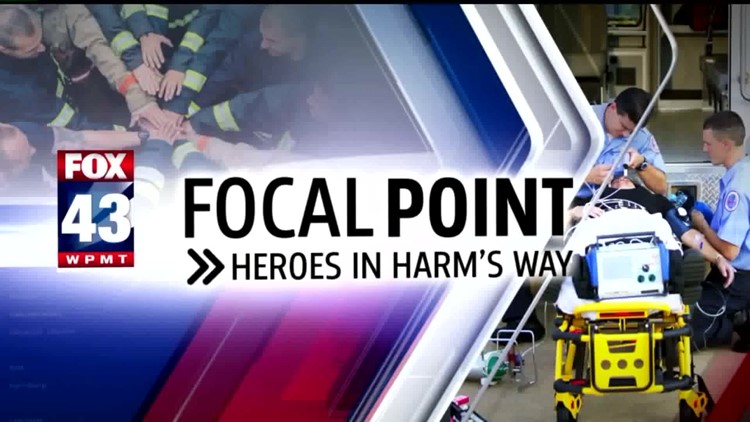LANCASTER, Pa. -- "If we are not doing everything we possibly can to make them successful or help them be successful in their job, mental health being one of them - we are failing them," said Chief Jarrad Berkihiser.
From depression to post traumatic stress, first responders are suffering from mental health issues.
It can be hard for those who help to ask for support, but experts say there are resources and professional help is out there.
Each of us experiences our own trauma - critical incidents that shake up our world, like the death of a pet or even a parent.
First responders, they see those things every day.
"One of the biggest stumbling blocks for us in seeking help is the fact that people call us for help," added Berkihiser.
Chief Jarrad Berkihiser with Lancaster Bureau of Police says they're the super heroes, the problem solvers, the investigators who catch the bad guys.
When it comes to actually talking about the bad things they see and hear, though, some officers have a hard time talking about it.
"A lot of our officers are very protective of their families so what they see here and do here they may not take home and talk to their spouse about," he said.
On top of that, police officers may not even talk to each other when something is bothering them.
"We might think of each other as less than a police officer because we can't fix the problem," said Berkihiser.
There could be fear of looking weak, being reported to a superior and taken off the street, or even the fear of being misunderstood.
"They expect maybe they'll get a negative reaction or shocking reaction when they talk about the things they have seen. The problem is there aren't enough mental health providers who have that experience," he said.
"The thing we do in our debriefings is we make it safe and easy for the first responders to talk about things they do not want to talk about," explained Dr. Kenneth Ralph, a therapist in Lancaster County.
Ralph has experience working with first responders and what they see, hear, and do on a daily basis.
Ralph and a team of volunteers are called in during those especially emotional situations when the stress may be too much for first responders to bear.
"They begin to understand that what they are experiencing is not abnormal. It's a normal experience to an abnormal situation," explained Dr. Ralph.
Ralph and those volunteers let the first responders talk. It's a group setting with all the paramedics, firefighters, and police officers called to a traumatic scene.
"What was most troubling to them, 'it was a child. I have a child at home that is the same age.' What is really neat, is almost always the other members, will support them and say, 'You did the right procedure, or there was no way to save this person,'" explained Ralph.
Besides Lancaster, many counties in Pennsylvania have their own critical incident stress management teams or similar programs in place.
As for other forms of support, Chief Berkihiser says it is important for his officers to seek it sooner rather than later.
He has even urged leadership at the bureau to work with the officers when it comes to their mental health needs.
"If somebody comes to you, let's do what we can to make the accommodations because we invest so much into this person," he said.
For first responders, the resources are there; it's as simple as being willing to seek them.
From Code Green to Blue Help to Safe Call Now, there are a number of resources online for first responders and a number of people to call when first responders need to talk to someone who knows the line of work.
Many websites offer confidential services.
Berkihiser says it's also important to know that seeking help is not a career-ending dilemma; it could actually be career-saving or even lifesaving.
Lancaster Bureau of Police released information on how officers can keep themselves mentally healthy, stressing a yearly mental health check just like a physical wellness check:
- Visit a licensed mental health professional to develop a relationship that can be relied on later.
- It is a confidential visit that does not trigger a report. No information returns to your department.
- It is not a Fitness for Duty Evaluation. It is a check-in to learn new skills and set goals if desired.
- The Mental Health Check is part of your normal maintenance routine. Take it seriously.
- It’s a chance to review your current and/or past mental health status, and receive professional support.
- The Mental Health Check is fully voluntary and encouraged by agencies, chiefs and all supervisors.
- If you are in crisis and need help please contact your Employee Assistance Program (EAP), local Crisis Intervention, Peer-to-Peer counselors, or department chaplain.
It also reads, "These losses in the Law Enforcement, the First Responder, and Emergency Dispatcher Community are a growing but preventable epidemic."



